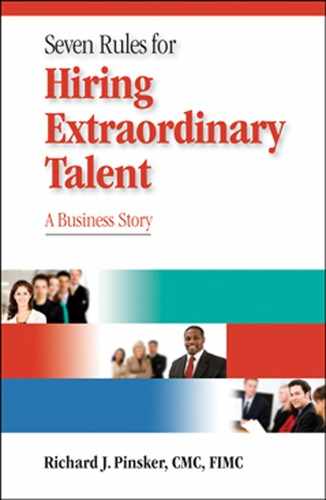Don’t Be Fooled by the Halo Effect
“OK, Charles, what’s the fourth rule?”
“Let me start with an example,” responded Charles. “Early on in Roger’s company he had an outstanding salesperson. This woman could sell refrigerators to Eskimos. Turn her on to a prospect and you were almost guaranteed a sale. As the company grew, Roger wanted to reward Linda further by making her a regional sales manager. That turned out to be a big mistake.”
“What happened? Promotions like that are done all the time. In fact we did the same a couple of years ago.”
“I hope your experience was better than Roger’s.” Looking at Roger, I asked “So what happened to Linda?
With a grin he said,”Charles sure knows how to put a point across. Linda was good, that is, until I made some changes.”
“What happened?”
“I assume Charles told you she was the best sales person we had at the time. As a reward for doing such a great job, I promoted her to a regional sales manager position. Unfortunately, I ended up with the worst of two worlds: we gained a rather weak regional sales manager and lost a stellar sales performer. I fell for the myth.”
“What myth?” I asked.
“The myth that just because someone is top notch in one job, they automatically are going to be a top performer or very knowledgeable in another position. It’s a false assumption that many people make. It’s easy to be impressed with a person who is recognized for certain performance.”
Charles jumped in: “That is the forth rule. I call it ‘Don’t be Fooled by the Halo Effect’. It’s a fairly common mistake made by hopeful, but perhaps undisciplined, hiring managers. They take for granted that a winning performance in one skill or situation is always transferable.”
“I have seen other examples,” added Roger. “When we were interviewing candidates to be a manager of one of our smaller, but growing divisions, we came across a general manager of a major division of one of the giant semiconductor companies. He had quite an impressive track record and was well known in the industry. We felt excited about the thought that he would even consider joining our company. However, after several very thorough interviews, thanks to Charles’s coaching, we decided not to pursue him.”
“What turned you off?” I asked.
“Although he appeared to be a solid candidate, probing indicated he was not the hands-on manager as we needed. He was aloof and distant from his team. He had created a management empire, which we would have difficulty accepting even in the best of times. In short, our lean-and-mean approach to running a business was not compatible with his style.”
“The Halo Effect again,” I said . . . “Assuming one will be good in areas other than where they have been recognized as a hero, so to speak.”
“That’s just like in golf,” added Harry. “You don’t see the top winners from the Long-Drive contests on the PGA Tour. They’ve mastered the long drive, but that specialty doesn’t carry over to the rest of their game.”
“You see this in product promotion all the time on TV,” commented Charles. “Celebrity spokespersons endorsing a product, not necessarily because they use it, but because they are paid to say they use it. This gives the viewing consumer the impression that the celebrity likes the product. Just note some of the product endorsements on The Golf Channel info-commercials and you will see how easy it is to fall for the Halo Effect.”
“It’s not difficult to overcome the Halo Effect. You need to be disciplined in your selection process.”
“What do you mean?”
“Two of the steps in the hiring process will void the Halo Effect; good probing during the interview and probing equally as hard when checking references. By probing, I mean digging for examples of what the person has accomplished, their management style, and how they work with others. Don’t treat what they say as gospel, but continue to probe until you feel comfortable you’ve gotten behind the façade.”
That “Halo Effect” seems pretty easy to avoid. It boils down to making sure the reason for a candidate’s high level of performance is transferable to our performance expectations.
Lesson Four: Don’t be Fooled by the Halo Effect
Superstar performance may not apply to your situation. That happens when you assume outstanding performance by a candidate in one particular facet of his or her job will apply to the performance you expect of a candidate in a different position. Skills and experience are not always transferable from one position to another or from one company culture to another. For example, the skills that have made a person very successful in selling a product or service are quite different than the skills required to be a sales manager. Or, a candidate who has been a leader in a large corporation may not have the attributes to lead a small entrepreneurial organization.
Two steps in the hiring process will void the Halo Effect. First, during the interview, probe the candidate for examples of his or her performance and style to compare to your requirements. And second, when speaking with candidate references, probe equally as hard for specific examples of performance. Describe the performance you expect of the individual you are hiring, and ask the reference person for examples of similar performance.
The “Halo Effect” may be awe striking, but don’t let it over shadow your requirements.
